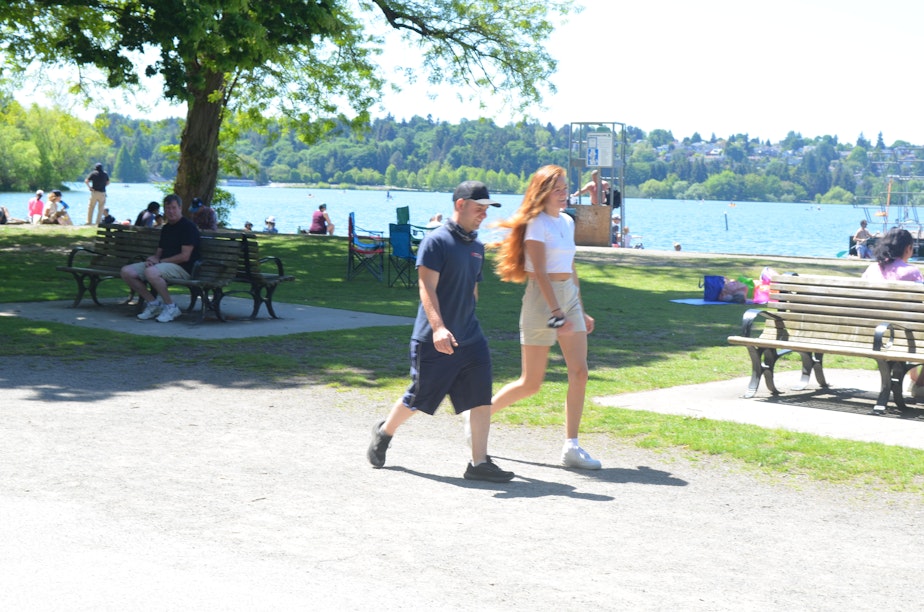‘The virus spreads like cigarette smoke.’ It’s really hard to transmit coronavirus outside

For most of the pandemic, Miriam Fuchs avoided the Green Lake loop trail in Seattle.
“It didn't seem worth it for how upset I got at folks who weren't following guidance,” Fuchs said. “So many people would run by very closely without masks on, and it felt like folks didn't care about the people around them.”
At the time, Washington state required masks outdoors if you were within six feet of others. Places like Green Lake were a grey area, where you could often keep your distance from others — but on busy days, might have to pass closer.
But, now, the Centers for Disease Control and Prevention say it’s OK for the fully vaccinated to remove their masks in most settings. King County still requires masks in indoor public spaces, but outdoor public spaces are a different matter.
Some have embraced this transition back to normalcy, going on walks and to parks with their faces uncovered. But others worry that unmasking — even outdoors — could be dangerous. Others are just having trouble adjusting and worried about what others might think.
In liberal Seattle for most of the pandemic, wearing masks — even when outdoors and socially distanced — was a way of signaling your care for others or your support for policies that slowed the spread of the coronavirus.
Miriam Fuchs said she and her partner became more comfortable being outdoors and unmasked last summer, when new data came out showing how unlikely it is to transmit the virus outdoors. But in the fall, they retrenched.
Sponsored
“As the new variants came out, we got more nervous again,” Fuchs said.
All winter long, she and her partner avoided Green Lake, and its unmasked runners.
But even the more contagious variants of the coronavirus don’t really spread outdoors, according to Linsey Marr at Virginia Tech. Marr researches airborne transmission of viruses.
The only way to transmit the virus outdoors is in a face-to-face conversation at close proximity, or maybe running directly behind someone for a long time, Marr said.
“The virus spreads like cigarette smoke,” Marr said. “You need to breathe in a certain amount of it before you start placing yourself at risk. So one whiff of it isn’t a big deal. Indoors, it can accumulate in the air; you could be exposed to a lot of it.”
Sponsored
Outdoors, Marr said, the virus gets diluted quickly.
She said scientists have known this for over a year, but public health agencies didn’t communicate that information well.
“The message got garbled,” Marr said. “I can see how things seem really screwy if you’re the average American who’s relying on the CDC for guidance.”
Public health messaging that left people confused about the state of the science was one reason people wore masks when they didn’t need to.
Jane Simoni, a psychologist at the University of Washington, said there was another reason too.
Sponsored
“It did come from a place of fear, and a place of seeking security, safety, certainty, in an era when we did not have that,” Simoni said.
She said wearing a mask was psychologically rewarding, and that sense of security and control is going to be hard to let go of now that fully vaccinated people are being told that it’s okay to unmask.
Marr, the aerosol expert from Virginia Tech, said it’s been hard for her to adjust. She started seeing people without masks at the grocery store a month ago.
“The first few times I saw them, I was still angry,” she said, “which is weird because I know the science on this.”
Marr is fully vaccinated, so she knows she’s very well protected from Covid.
Sponsored
Still, “it’s going to take some time to get used to the idea,” she said.
These days, people in Seattle are warming to the idea, and you don’t see too many masks at Green Lake anymore.
Last weekend, Jill Walzer was there walking with a friend.
“It's surprising, because we've been masked for so long, but it doesn't really make me feel nervous,” Walzer said. “If I feel nervous in an area, I'll just put my mask on.”
Nearby, Alexandria Cox said she’s not ready to take her mask off walking around the lake, and she’s not sure what it would take for her to feel safe doing so.
Sponsored
“The number of people vaccinated increasing?” she said. “I don't know; I might continue wearing it longer.”
Miriam Fuchs, who avoided Green Lake during most of the pandemic, was there too, walking her dog around the lake — and not wearing a mask.
And, she said, she’s no longer upset when she sees others not wearing masks either.
“Now that the CDC recommends not wearing a mask outdoors, and there's all this science around not transmitting outdoors, I feel like I show that I believe in science by still wearing a mask indoors but not outdoors,” she said. “It just doesn't make sense now that I’m vaccinated as well.”




